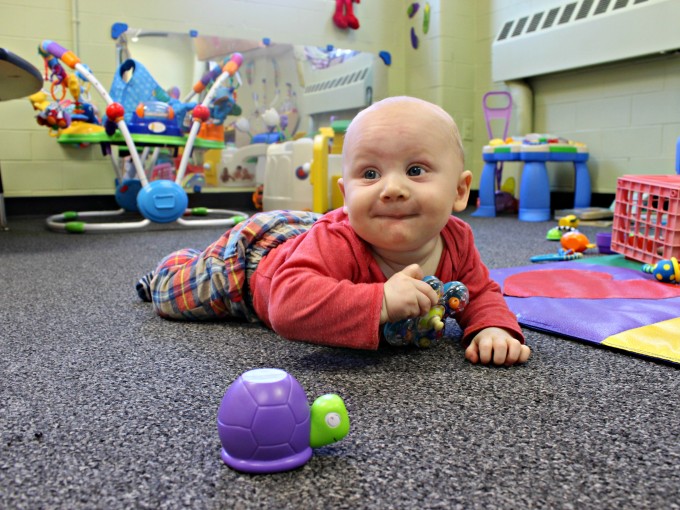Torticollis
Carrie Barlow is a licensed Physical Therapist, Board Certified Pediatric Specialist, and Director of the Physical Therapy and Occupational Therapy programs at Franciscan Hospital for Children. If you have Torticollis or PT-related questions, please email us at info@fhfc.org or call (617) 254-3800, ext. 2180.

Thanks to a child from our Franciscan Family Child Care Center, for demonstrating how daily Tummy Time can help to encourage head movement in all directions and strengthen neck and back muscles while playing!
Torticollis. A word that might make you think of tortoises or turtles, Torticollis is actually Latin for “twisted neck.” As a parent, you might recognize Torticollis in a few different ways. Your baby or toddler may hold their head tilted to the side, or turn their head in just one direction. Torticollis can also be associated with Plagiocephaly, or a flat head.
Today, Torticollis is more common than in years past, though there is no definite explanation as to why. There are some theories, one of the most common being that babies are spending more time on their backs – whether in an infant seat, swing, car seat or even cribs.
While Torticollis is a serious diagnosis, the good news is that it can be treated easily and effectively with Physical Therapy. Pediatric Physical Therapists often work with babies on gentle stretching and strengthening of their neck and shoulder muscles, along with teaching parents ways to hold, position, and encourage baby to move their head and neck in all directions.
For families, it’s good to remember that babies benefit from “Tummy Time.” According to the American Physical Therapy Association and the American Academy of Pediatrics, playing with baby on their tummy helps them learn to use their back and neck muscles. It’s also a new and different way for them to see the world around them, and encourages them to move their head in many directions.
Additionally, try to minimize the amount of time an infant spends in a seat or carrier. This equipment can be confining, whereas playing on the floor encourages baby to turn their head from side to side and practice for even bigger milestones… like rolling!
As always, check with your pediatrician if you have immediate questions or concerns.
Additional resources for families:
American Academy of Pediatrics – Tummy Time
American Physical Therapy Association – Guide to Torticollis